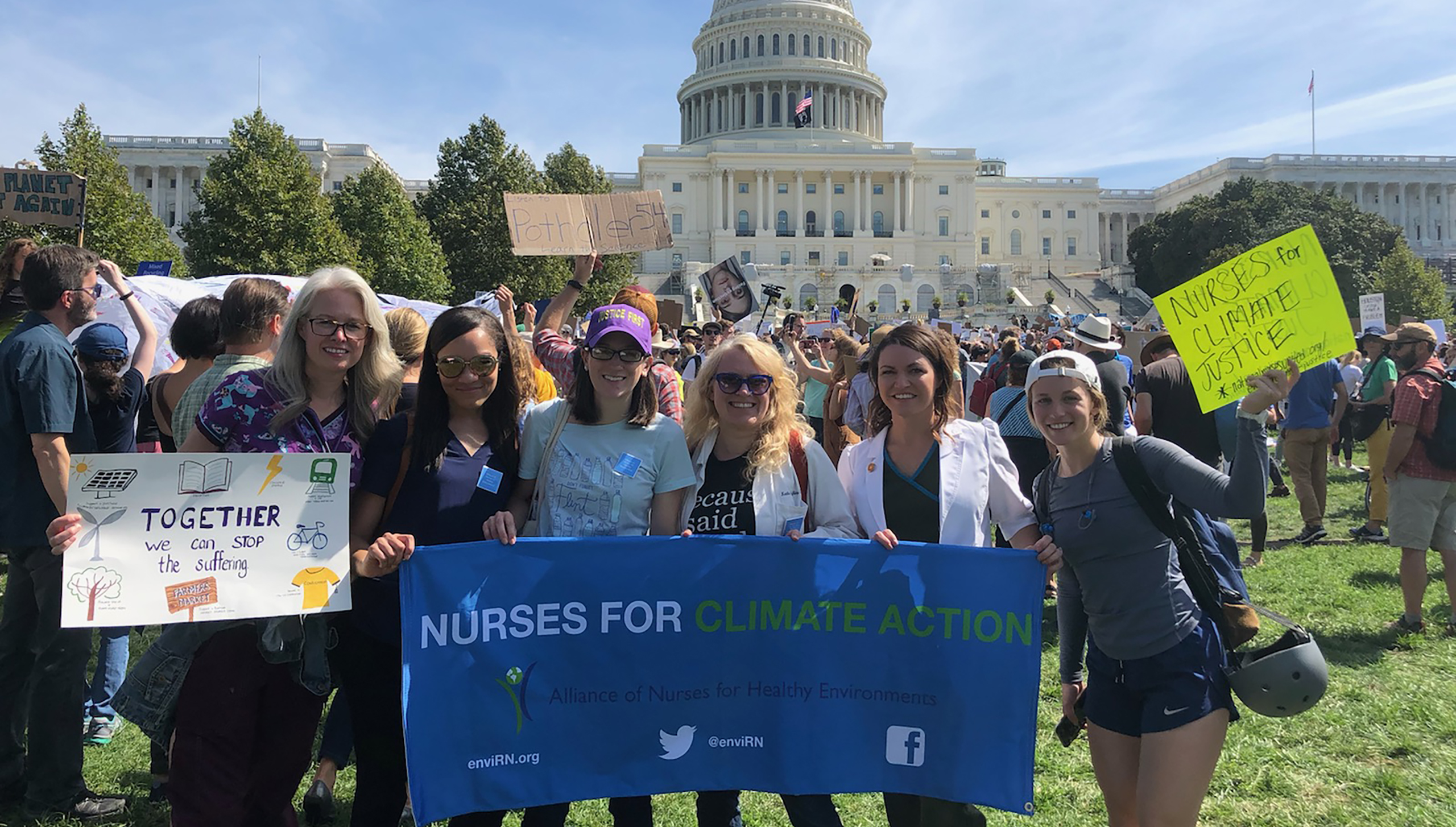Nurses have always known that the best way to prevent needless suffering and death is through strong and effective public and population health. We therefore plan to do all that we can to minimize the chance of future pandemics. That means we need to protect the health of the planet in order to protect the health of humanity. Even in the midst of a global pandemic, nurses are dedicated to building a healthier future.
The science is clear, the climate crisis poses one of the greatest risks to health that humanity has ever faced and the time to act is now if we are to avoid the most catastrophic impacts. Fortunately, the science is also clear that there are actions we can take to effectively drawdown the level of greenhouse gases in our atmosphere.
In her famous book Notes on Nursing, Florence Nightingale (1860) wrote:
It is often thought that medicine is the curative process. It is no such thing; medicine is the surgery of functions, as surgery is that of limbs and organs. Neither can do anything but remove obstructions; neither can cure, nature alone cures. Surgery removes the bullet out of the limb, which is an obstruction to cure, but nature heals the wound. So it is with medicine; the function of an organ becomes obstructed; medicine, so far as we know, assists nature to remove the obstruction, but does nothing more. And what nursing has to do in either case is to put the patient in the best condition for nature to act upon him. (p. 133)
At the heart of nursing is the understanding that when we create the right environment, nature can heal itself. As the most numerous and most trusted health profession in the world, nurses can co-create a healthier future by embracing the actions of Nurses’ Drawdown.
Nurses across the globe are invited to participate in Nurses’ Drawdown. Since the earliest days of professional nursing, nurses have understood that optimal health requires good nutrition, adequate mobility, a healthy environment, and social support. Through commitment to Nursing Drawdown actions, nurses will improve the health of individuals and communities, while also taking steps to heal the planet.
In partnership with Project Drawdown, nurses from all specialties and in all practice settings are encouraged to take action in four key areas:
- ENERGY: Supporting a clean energy future by promoting energy efficiency and advocating for a transition to renewable energy
- FOOD: Commit to a plant-based diet, use of clean cook stoves, and reduced food waste
- MOBILITY: Bike infrastructure, walkable cities, and mass transit
- GENDER EQUITY: Educating girls and family planning
- NATURE-BASED SOLUTIONS: Planting trees, protecting tropical forests and forest protection
As nurses, we commit ourselves to improving the health of individuals, communities, and the planet now, and for generations to come.
Nurse Organization Partners
The Alliance of Nurses for Healthy Environments and Project Drawdown are so grateful for our many nursing organization partners:
- American Nurses Association – California
- American Public Health Association – Public Health Nurses Section
- Association of Community Health Nursing Educators
- Australian College of Nursing
- CANE/AIIE: Canadian Association of Nurses for the Environment/Association d’infirmières et infirmiers pour l’environnement
- Italian Nurses Association
- Green Nurse Network
- International Council of Nurses
- Irish Nurses and Midwives Organisation
- Minnesota Organization of Registered Nurses
- National Association of Hispanic Nurses
- National Student Nurses Association
- New Directions for Nurses
- Nurse Practitioners in Women’s Health
- Preventive Cardiovascular Nurses Association
- SEIU Nurse Alliance
- The Compassion Caravan
- The GalesActGreen
- Washington State Nurses Association Occupational and Environmental Health and Safety Committee
Other nursing organizations are enthusiastically welcomed as partners. If you would like to sign your nursing organization on as a partner please go here.
Planning Committee
A very special thank you to the planning committee of Nurses Drawdown. Your dedication, countless volunteer hours, and commitment to Nurses Drawdown has been remarkable. This initiative is a true labor of love for these amazing nurses:
Tucker Annis, BSN, RN
University of Minnesota School of Nursing
Oriana Beaudet, DNP, RN, PHN
Vice President of Innovation
ANA Enterprise
Erica Burton, RN, BScN, MPH
Senior Advisor, Nursing and Health Policy
International Council of Nurses
Director, Kaiser Permanente/USF Partnership
University of San Francisco
Executive Director
Alliance of Nurses for Healthy Environments
Professor of Nursing Population Health and Systems Cooperative Unit
Director, Katharine Densford International Center for Nursing Leadership
University of Minnesota School of Nursing
University of Minnesota School of Nursing
Professor, Director of Planetary Health
University of Minnesota School of Nursing
Barbara Sattler, RN, DrPH, FAAN
Professor, Public Health Program
University of San Francisco
Executive Director of Environmental Stewardship
Providence St. Joseph Health
Please share:

